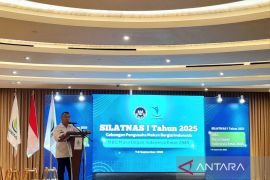"It will automatically increase state revenues from the excise sector if the price of cigarettes is increased. It means it will help make the state budget healthier in the future," said Ade Komarudin.Jakarta (ANTARA News) - The governments reported plan to significantly hike cigarette prices has sparked pros and cons reactions from various circles such as cigarette industries, lawmakers and other quarters.
Chairman of the Indonesian White Cigarette Producers Association (Gaprindo), Muhaimin Moefti, expressed worries that the plan if implemented would harm cigarette industries. Some factories can face bankruptcy and close down.
The significant price increases can reduce industries sales turnover as cigarette consumption by low-income people will decline. It can also lead financially weak addicted smokers to commit crimes.
The normal prices of cigarettes currently range from Rp15,000 to Rp25,000 (US$1,13 - US$18.05) per pack. The government is planning to raise prices up to about Rp50,000 (US$36.10) per pack.
This means that a smoker who consumes one pack of cigarettes a day would spend some Rp1.5 million per month for cigarettes, a price which is higher than the workers monthly basic minimum wage of Rp1.4 million in West Nusa Tenggara Province, for instance.
"Cigarettes price is higher than the salary of an auxiliary teacher," Zaki Nur Salim said on his Facebook wall.
After all, bankruptcy of cigarette industries will also harm state revenues as cigarettes/tobacco taxes contribute the largest portion of the countrys tax receipts. Cigarette taxes in the state budget amount to R141.7 trillion and contribute 52.7 percent to the countrys overall tax revenues.
"No matter what kind of goods they are, they will have adverse impacts if their prices are increased too high," Muhaimin Moefti was quoted by Indoberita.com online media as saying on Saturday.
Therefore, Mukhamad Misbakhun, a member of Commission XI on financial affairs of the House of Representatives (DPR) warned the government to be cautious with regard to its plan to increase cigarette price to Rp50,000 per pack.
According to Misbakhun, if the price of cigarettes is raised by Rp50,000 per pack, it will cause many cigarette factories to close down and thousands of workers will lose jobs. It will in the end affect small, medium and large scale industries.
"Small scale cigarettes industries are already facing heavy burden as the government also imposes a higher rate of cigarette excise band which is regarded as less protective to industries interest.
Misbakhun who is a politician of the Golkar Party explained that if cigarette factories were closed down, millions of workers will lose jobs. Thus, it will increase the number of those living under the poverty line. The fate of tobacco farmers also becomes uncertain as factories absorbing their products are losing business.
He said the tobacco industry from its upstream to downstream sector has an important role with wide impact in generating national economic activities.
Moreover, cigarettes in the industrial sector contributes 5-7 percent to the economic growth. It also contributes Rp141.7 trillion to state revenues in the state budget.
Misbakhun pointed out that tobacco industry contributes 52.7 percent to the tax revenues as compared to the real sector, for instance, which only contributes 15.7 percent.
Moreover, tobacco industry is a labor-intensive industry which absorbed workers up to 6.1 million, excluding workers absorbed by cigarette industry related sectors such as agriculture, tobacco seedlings and others.
In the meantime, House Speaker Ade Komarudin said the state revenues in the state budget from the excise sector will increase if the government raised cigarette prices.
"It will automatically increase state revenues from the excise sector if the price of cigarettes is increased. It means it will help make the state budget healthier in the future," said Ade Komarudin in a written statement in Jakarta on Saturday.
He said that the governments plan to hike cigarettes prices aimed to reduce the number of smokers in the country. He is of the view that the price increase will not have significant impact on cigarette industry and the tobacco farmers.
"I am convinced that it will not disturb tobacco farmers and could work normally as usual," he said.
As has been published earlier, various studies showed that active smokers have higher possibility to stop smoking if the prices of cigarettes are raised by at least twice as high as the normal prices.
Regarding tobacco, various circles from the health sector and the younger generation have so far called on the government to ratify the Framework Convention on Tobacco Control (FCTC) treaty.
The World Health Organization (WHO) has circulated the convention since May 21, 2003, in an effort to curb tobacco consumption in the world.
However, the Indonesian government has yet to accede to the convention as over six million people earn a livelihood as workers in tobacco industries or as tobacco farmers.
The Framework Convention on Tobacco Control Youth Movement (GM-FCTC) has questioned the governments reluctance to accede to the convention amid increasing number of young smokers.
The GM-FCTC viewed the governments hesitance to ratify the convention as odd, especially at a time when 180 countries in the world, realizing the importance of controlling tobacco consumption, have acceded to the FCTC.(*)
Reporter: Andi Abdussalam
Editor: Heru Purwanto
Copyright © ANTARA 2016











